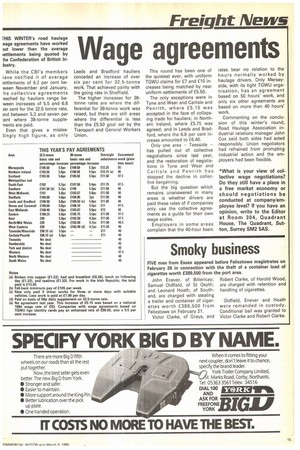Wage agreements
Page 17

If you've noticed an error in this article please click here to report it so we can fix it.
While the CBI's members lave notified it of average 3ettlements of 6,2 per cent beween November and January, he collective agreements -eached by hauliers range beween increases of 5.5 and 6.8 )er cent for the 32.5 tonne rate, Ind between 5.3 and seven per .:ent where 38-tonne supple-nents are paid.
Even that gives a misleaJingly high figure, as only Leeds and Bradford hauliers conceded an increase of over six per cent for 32.5-tonne work. That achieved parity with the going rate in Sheffield.
The higher increases for 38tonne rates are where the differential for 38-tonne work was raised, but there are still areas where the differential is less than the £5.50 goal set by the Transport and General Workers Union. This round has been one of the quietest ever, with uniform TGWU claims for £7 and £10 increases being matched by near uniform settlements of £5.50.
The only exceptions were in Tyne and Wear and Carlisle and Pen rith, where £5.15 was accepted in the face of collapsing trade for hauliers; in Northern Ireland, where £5.75 was agreed; and in Leeds and Bradford, where the 6.8 per cent increase amounted to£6.40.
Only one area -.Teesside has pulled out of collective negotiations since last year, and the restoration of negotiations in Tyne and Wear and Carlisle and Penrith has stopped the decline in collective bargaining.
But the big question which remains unanswered in many areas is whether drivers are paid these rates of if companies only use the collective agreements as a guide for their own wage scales.
Employers in some areas complain that the 40-hour basic rates bear no relation to the hours normally worked by haulage drivers. Only Merseyside, with its tight TGWU organisation, has an agreement based on 50 hours' work, and only six other agreements are based on more than 40 hours' work.
Commenting on the conclusion of this winter's round, Road Haulage Association industrial relations manager John Cox said both sides had acted responsibly. Union negotiators had refrained from prompting industrial action and the employers had been flexible.
















































































